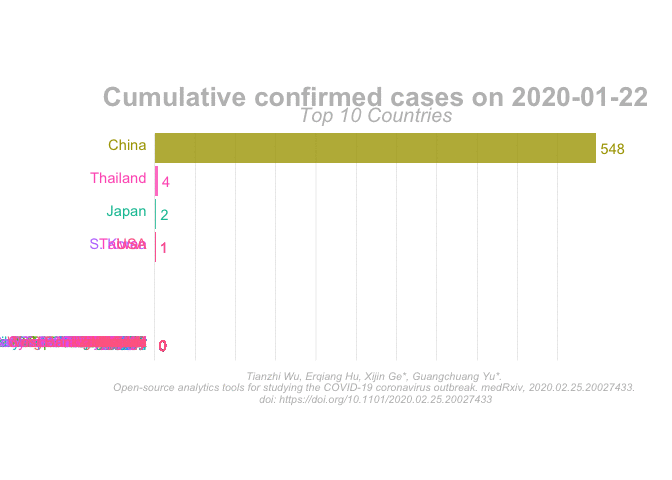Animated Barplots
I used to love watching videos from “data is beautiful”, where barplots where animated and overtaking each other over time to show data changing over time.
Now I wanted to create one myself using R. I chose to use covid-data for this, because it is a relevant topic at these times.
I dug the web and stackoverflow and R-bloggers had answers for me. It is indeed possible to create nice animation movies out of plots in R and save them as GIF or mp4!
Goals:
- create a bar plot as known from “data is beautiful” (youtube https://www.youtube.com/channel/UCkWbqlDAyJh2n8DN5X6NZyg)
- use n-COVID-19 data to see the top countries animated
- smoothen it up!
Turns out gganimate can help us achieve this, by animating the bars created by ggplot.
I added as many clarifying comments in the code as possible. Have fun recreating / improving!
Let’s start by loading the data and do some data wrangling:
# to get nCov2019 dataset:
#install.packages("remotes")
remotes::install_github("YuLab-SMU/nCov2019")
library(nCov2019) # the dataset
library(plotly) # the animation library
library(tidyverse) # useful for wrangling
library(gganimate) # for the animations
library(magrittr) # %<>% function is a dplyr shortcut, look it up ;)
library(magick) # the renderer for gif files
#### LOAD DATA ####
res <- query()
Now we can get the covid data:
y =res$historical
d <- y["global"]
# get global data:
# FORMAT DATA
formatted <- d %>%
group_by(date) %>% # group by the date
mutate(rank = min_rank(-cases) * 1, # create a rank for every day
Value_lbl = paste0(" ", round(cases))) %>% # create labels for the values
group_by(country) %>%
filter(rank <= 10) %>% # get the top 10 ranks every day
filter(date > as.Date("2020-01-01")) %>% # filter custom date
ungroup()
formatted$date = as.Date(formatted$date)
head(formatted)
## # A tibble: 6 x 7
## country date cases deaths recovered rank Value_lbl
## <chr> <date> <int> <int> <int> <dbl> <chr>
## 1 Afghanistan 2020-01-22 0 0 0 7 " 0"
## 2 Afghanistan 2020-01-23 0 0 0 9 " 0"
## 3 Afghanistan 2020-01-24 0 0 0 10 " 0"
## 4 Albania 2020-01-22 0 0 0 7 " 0"
## 5 Albania 2020-01-23 0 0 0 9 " 0"
## 6 Albania 2020-01-24 0 0 0 10 " 0"
Great! We have a rank for every day for every country in the top 10. Now let us use this inside ggplot and use gganimate to get it animated!
# animate
animated <-
# create a ggplot with ..
ggplot(formatted, aes(rank, group = country,
fill = as.factor(country), color = as.factor(country))) +
# the aesthetics for the bars: y position, height, alpha is the opacity
geom_tile(aes(y = cases/2,
height = cases,
width = 0.9), alpha = 0.8, color = NA) +
# the labels for the countries in front, the paste0
# needs to be there for the right position
geom_text(aes(y = 0, label = paste(country, " ")), vjust = 0.1, hjust = 1) +
# the labels for the numbers.
geom_text(aes(y=cases, label = paste0(Value_lbl), hjust = 0)) +
# flip the coordinate system, clip off for the right display
coord_flip(clip = "off", expand = FALSE) +
# reverse the x-scale to have the largest bar on top
scale_x_reverse() +
scale_y_continuous(labels = scales::comma) +
# to make the background grid lines moving, use view_follow
view_follow() +
# this is for removing redundant labels etc:
guides(color = FALSE, fill = FALSE) +
# change background & theme
theme(axis.line=element_blank(),
axis.text.x=element_blank(),
axis.text.y=element_blank(),
axis.ticks=element_blank(),
axis.title.x=element_blank(),
axis.title.y=element_blank(),
legend.position="none",
panel.background=element_blank(),
panel.border=element_blank(),
panel.grid.major=element_blank(),
panel.grid.minor=element_blank(),
panel.grid.major.x = element_line( size=.1, color="grey" ),
panel.grid.minor.x = element_line( size=.1, color="grey" ),
# aesthetics for the title, subtitle etc.
plot.title=element_text(size=20, hjust=0.5, face="bold", colour="grey", vjust=-1),
plot.subtitle=element_text(size=15, hjust=0.5, face="italic", color="grey"),
plot.caption =element_text(size=8, hjust=0.5, face="italic", color="grey"),
plot.background=element_blank(),
plot.margin = margin(2, 2, 2, 4, "cm")) +
# the transition between the states is defined here
transition_states(date, transition_length = 25, state_length = 5) +
# to make the countries overtake each other more smoothly:
# more options to smoothen the transitions
enter_grow() +
exit_shrink() +
ease_aes("cubic-in-out") +
labs(title = 'Cumulative confirmed cases on {closest_state}',
subtitle = "Top 10 Countries",
caption = "Tianzhi Wu, Erqiang Hu, Xijin Ge*, Guangchuang Yu*.
Open-source analytics tools for studying the COVID-19 coronavirus outbreak. medRxiv, 2020.02.25.20027433.
doi: https://doi.org/10.1101/2020.02.25.20027433")
# this is the animation here
animate(animated, duration = 75, fps = 25, renderer = magick_renderer())

